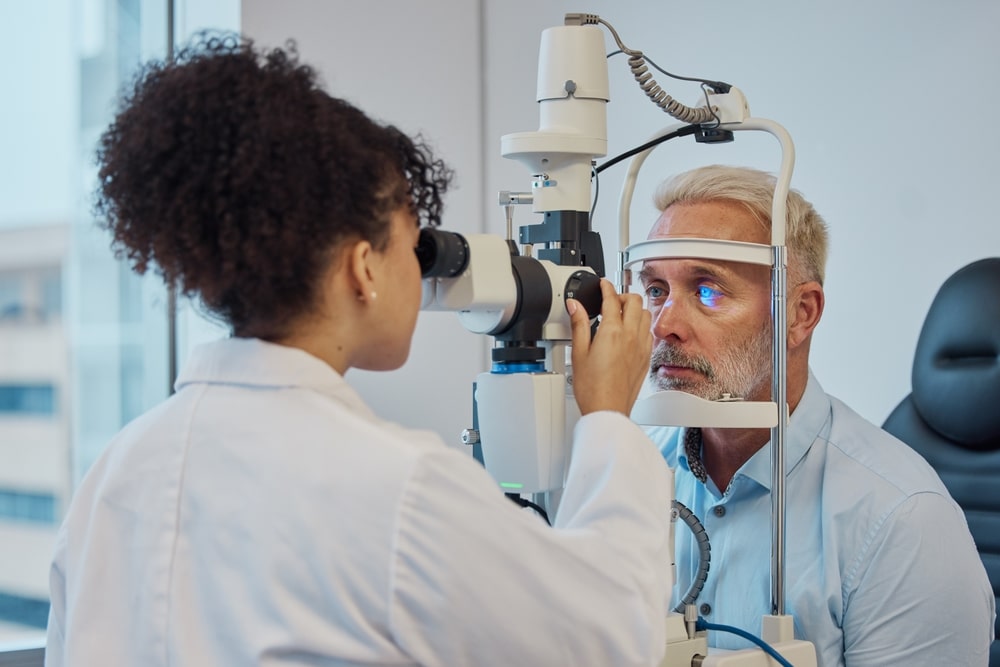
Glaucoma is an age-related eye condition that is the second leading cause of blindness in older adults worldwide. It typically develops slowly and is often diagnosed only after it has caused irreversible vision impairment.
Glaucoma occurs when the fluid in your eye, the aqueous humor, does not drain properly, causing a buildup of intraocular pressure. High levels of pressure within your eye cause damage to the optic nerve, which is the structure in your eye that transmits visual information from the retina to the brain.
The best way to prevent glaucoma from affecting your eyesight is to schedule annual comprehensive eye exams. At these exams, your eye doctor will perform a series of tests that specifically look for signs of developing glaucoma.
Keep reading to learn more about what eye doctors look for when diagnosing glaucoma.
What are the Signs of Glaucoma?
When you come in for an exam, your eye doctor will first review your medical history and ask about any problems you might be having with your vision.
While the exact cause of glaucoma is unclear, certain factors may put you at a higher risk for developing this eye condition. These factors include:
- A family history of glaucoma
- Certain chronic health conditions, including diabetes and high blood pressure
- Your age
- Past eye injuries or surgeries
- Use of certain medications, like corticosteroids
- Thin corneas
If you are having issues with your vision, specific symptoms could indicate glaucoma. These symptoms include:
- Tunnel vision or blind spots
- Rainbow-colored haloes around lights
- Blurry vision or poor-quality vision
- Eye redness
- Eye pain or pressure
How Do Eye Doctors Test for Glaucoma?
The next step your eye doctor at Rosenthal Eye Surgery will take when diagnosing glaucoma at a comprehensive eye exam is to perform a series of tests to look for the physical signs of glaucoma. These tests include:
Angle Exam
During an angle exam, your eye doctor will touch the surface of your eye with a special lens. This lens tests whether your eye’s drainage angle is unblocked and working correctly.
Because proper drainage of the aqueous humor is essential for maintaining healthy eye pressure, a blocked angle can increase intraocular pressure and result in glaucoma.
Eye Pressure Check
An eye pressure check, or tonometry test, gauges the pressure within the eye. Increased intraocular pressure is often a sign of glaucoma.
During a tonometry test, your eye doctor will use a small probe to gently flatten the cornea to measure eye pressure. Eye pressure is calculated by the eye’s resistance to being probed.
Examination of the Optic Nerve
Your eye doctor will usually perform a dilated eye exam to check for signs of damage to the optic nerve. During this exam, medicated eye drops dilate the pupil, allowing your eye doctor to look more closely at the structures within your eye.
An alternative to a dilated eye exam is optical coherence tomography, a technology that creates detailed digital images of the structures of the eye. These images can show signs of damage and track changes over time.
Visual Field Test
Glaucoma often affects peripheral vision first. A visual field test assesses the quality of the whole field of vision.
During this simple test, your eye doctor will have you follow an object with your eyes as it is moved from one side of your field of vision to the other. Often, this test is performed while one eye is covered to measure the quality of vision in each eye.
While there is no cure for glaucoma, early diagnosis is key to preventing glaucoma from seriously damaging your vision. You can ensure your eye doctor diagnoses glaucoma early by scheduling annual comprehensive eye exams, which include important diagnostic tests for glaucoma.
When was the last time you went for an eye exam? Schedule an appointment with Rosenthal Eye Surgery in New York, NY, today!
